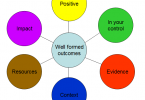Helping Career Changers Around The World
May 2012

Are you really struggling with your career change? Do you sometimes wonder if maybe it’s just you and everyone else finds it a breeze?
Well relax! EVERYONE finds change tough going.
Wondering why that is?
Because change is not a simple matter of deciding something and then doing it – you need to get a number of different pieces working together. If you don’t – it probably won’t work!
So what are these pieces, you may ask?
Two Uncomfortable Bedfellows
Depending on your natural preferences, you will probably kick off with a rational or an intuitive approach to change.
So if you are more of a rational person, you may start by sitting down and writing a list of pros and cons. This is the sensible thing to do after all, you tell yourself. Or you begin to collect facts and figures about possible new careers and maybe you decide to do some psychometric assessments in the hope that they will tell you what is the best route forwards. You become a relentless researcher, always looking for a bit more information.
But then you start weighing up and analysing your ideas…and somehow get into an endless circle that never comes to a satisfactory conclusion. You get stuck in analysis paralysis.
If you are more of an intuitive and creative person by nature, you may on the one hand be bubbling over with ideas for new careers, but they never become more than fleeting dreams.
On the other hand you may be too ready to let your fears and anxieties about change overwhelm you and you get frozen not so much by analysis but by visions of all the terrible things that might happen if you change career.
So with these two conflicting approaches fighting it out in your head, it is not surprising that change feels difficult.
So what do you need to do to smooth the path when working on making changes to your career?
The first step is to be aware that these two sides are fighting it out in your head in the first place. Once you start monitoring the habitual thoughts that preoccupy you, you will be able to step back, challenge them and take corrective action.
Helping the Rational Mind
- To keep the rational side happy and to avoid analysis paralysis, define some simple action steps to get you moving.
- Don’t over-analyse what is wrong with your current situation, focus instead on defining the key steps you need to take to a) understand yourself and b) explore the opportunities out there and then commit to doing just one at a time.
- Accept that to get anywhere you need to be moving forwards, however slowly. You will never be able to see the whole picture if you stand still and new possibilities will emerge as you make progress.
Helping the Emotional Mind
- To keep the emotional side happy you need to engage with the positive feelings that you associate with being in a new career, but at the same time understand that change will inevitably involve some interim discomfort. Don’t scuttle back to the safety of your old job at the first 2 o’clock in the morning moment!
- Don’t scare yourself with the enormity of the task – break it down into very small steps. Forget milestones – think ‘inchpebbles’ as Fred Heath from IBM said!
- And be sure to celebrate as you go along so you acknowledge the progress you are making and grow a sense of pride in what you have already achieved. Build a picture of yourself as someone who can make things happen.
Creating a Supportive Context
And you can help them both along by creating an environment that will support the changes you are trying to make. This could be things like:
- Having a brightly coloured folder for all your notes and research and perhaps creating a vision board that will be a constant reminder of what your heart, not your head, aspires to.
- Creating an action habit of spending a certain time each week working on your career change.
- Finding some fellow travellers on the career change journey who will support and encourage you and so you can feel like you are on a joint adventure.
To make change work, you need clear direction (to appeal to the rational mind), motivation (to appeal to the emotional mind) and a supportive environment.
So yes, change is hard and too much analysing or agonising won’t make it any easier. Once you start moving through it, you can look back over your shoulder and realise the process wasn’t so bad after all and your new destination has definitely made it worth while.
Thought for the Day
“A year from now you will wish you had started today.”
Karen Lamb
Cherry Recommends
 Who Moved My Cheese
Who Moved My Cheese
Spencer Johnson
This is a great little book which has become a classic on managing change. It explores how different people approach the changes that they find themselves confronted with in life.
The message is simple and succinct – you have to be willing to adapt to change as it happens around you if you are to survive. You might think you know this already – but are you really acting on this knowledge?
Written in the form of a parable, Who Moved My Cheese follows the adventures of Sniff and Scurry and contrasts them with Hem and Haw as they respond the changes in the cheese supply in the maze they live in.
It provides an essential reminder that if you are stuck in a situation that is not working for you, get up and do something about it!
A short and easy read, this is the book to turn to every time you are finding change a struggle just to remind you that there is a way out.
With best wishes for your career change success
5MCC Back Issues from May 2012
5MCC Back Issues to April 2012
Career Inspiration Back Issues







Leave a Comment